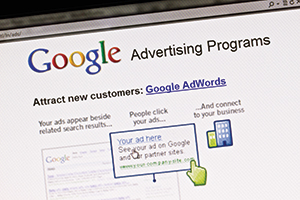 Failure isn’t fatal, but failure to change might be.” This quote by legendary basketball coach John Wooden is one to apply to your marketing and advertising efforts. Mistakes are common with the constant changes in digital advertising and, frankly, they’re expected. However, if you don’t learn from those mistakes and optimize your efforts, you may be throwing money away. After viewing hundreds of Google AdWords accounts as a marketing consultant, here are the top five things you, or your agency, is probably doing wrong.
Failure isn’t fatal, but failure to change might be.” This quote by legendary basketball coach John Wooden is one to apply to your marketing and advertising efforts. Mistakes are common with the constant changes in digital advertising and, frankly, they’re expected. However, if you don’t learn from those mistakes and optimize your efforts, you may be throwing money away. After viewing hundreds of Google AdWords accounts as a marketing consultant, here are the top five things you, or your agency, is probably doing wrong.
1. Using green industry jargon. We must understand that our industry is highly technical, but our consumer base is not. So when we decide on “keywords” for our pay-per-click (PPC) strategy, we must use our consumer’s language. For example, lawn diseases and weeds are often searched for online by descriptions, not proper names. So rather than looking for “lawn rust,” most people search “orange powder in grass/lawn.”
2. Having all your keywords in “broad match” setting. AdWords is built on the premise of bidding on “keywords” where you want your company’s ads to appear. That way when someone is searching for “lawn care in Cleveland,” your advertisement pops up. However, many times advertisers don’t know exactly what combination of words consumers use when searching for their services. For this reason, Google has created several match types to help your ads appear for multiple searches.
When creating an AdWords account, the keywords you begin to bid on are in a match type called “broad match,” so your ad will show when anyone searches for terms that are loosely related to the term you’re bidding on. The problem with broad match is you may be showing ads for searches you don’t want to appear for. For example, if you’re bidding on the keyword “lawn care” with the broad match setting, your ads will appear for searches such as, “lawn mowing service,” “grass mower repair, “where to buy grass” and so on.
The solution is to use “phrase match” and “exact match,” which only allows your ad to appear for searches using a combination of the words you’re bidding on.
3. Not using negative keywords. Negative keywords are all the terms for which you don’t want to appear. This feature limits the number of times your ad shows for irrelevant searches, limiting wasted spend. For example, adding negative keywords such as “free, cheap and discount,” limits the number of people searching for services using those adjectives.
4. Not tracking conversions. Tracking ROI is important and is something you can easily do in AdWords through the use of “conversions.” Conversions are counted in AdWords when a consumer clicks on your ad and reaches a “goal page” on your website that you set. For example, to track for sales, you would set the “conversion” to be when a consumer reaches a “thank you” page after filling out a request or sales form. By installing this code, you can accurately track your AdWords ROI.
5. Not using objective-specific landing pages. A landing page is the specific page your prospect sees after clicking one of your online ads. Like the saying “you can lead a horse to water, but you can’t make him drink” goes, you can lead consumers to your website, but you can’t make them take the actions you want. However, creating an objective-specific landing page that limits the number of options people have when reaching the page increases the chance they will take a desired action.
For example, if your objective is to have someone sign up for an estimate when reaching your web page, make the sign-up form the most prominent item on the page and remove all other things that may distract him or her from signing up. Other ways to increase landing page conversions are to limit text, remove navigation to other parts of your website and use language that matches what your ad promises.
Are you wasting money?
A good way to know is by having a professional perform a PPC audit on your accounts. A trained Google professional will examine your account and identify ways you can improve. On average, a good PPC audit can save you up to a quarter of your advertising spend and help to improve your return on your Google AdWords advertising investment.
Photo: ©istock.com/inbj


